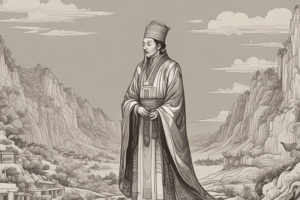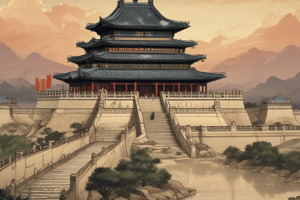Podcast
Questions and Answers
Who was Qin Shihuangdi?
Who was Qin Shihuangdi?
- Ruler of China who united China for the first time. (correct)
- A famous Chinese philosopher.
- Founding member of the Qin Dynasty.
- A leader in the Roman Empire.
What was the Qin Dynasty known for?
What was the Qin Dynasty known for?
Establishing the first centralized imperial government and building much of the Great Wall.
What is a republic?
What is a republic?
A political system in which the supreme power lies in a body of citizens who can elect people to represent them.
What did Confucius found?
What did Confucius found?
The educated upper classes in China are known as the ______.
The educated upper classes in China are known as the ______.
What are civil service exams?
What are civil service exams?
What does the term 'empire' refer to?
What does the term 'empire' refer to?
What were the Twelve Tables?
What were the Twelve Tables?
Who was Julius Caesar?
Who was Julius Caesar?
What does Pax Romana mean?
What does Pax Romana mean?
What are aristocrats in Roman society known as?
What are aristocrats in Roman society known as?
What was the Silk Road?
What was the Silk Road?
What system of government was Sparta known for?
What system of government was Sparta known for?
Who was Constantine?
Who was Constantine?
What did the ancient Greek philosopher Socrates contribute?
What did the ancient Greek philosopher Socrates contribute?
What is the Gupta Empire known for?
What is the Gupta Empire known for?
What are Vedas?
What are Vedas?
Flashcards are hidden until you start studying
Study Notes
Qin Shi Huangdi
- First ruler to unify China, significant for constructing roads, canals, and initiating the Great Wall.
- Established a standardized system of laws, currency, weights, and writing, influencing Chinese language and coinage.
Qin Dynasty
- Ruled from 246 BC to 206 BC, it created China's first centralized imperial government.
- Known for major construction of the Great Wall, establishing strong national unity.
Republic
- A political system where power rests with citizens who elect representatives, reflecting early democratic principles.
- Serves as a foundation for modern republics.
Han Dynasty
- Lasted from 202 BCE to 220 CE, reinforced centralization from the Qin Dynasty.
- Prioritized Confucianism and education over Legalism, shaping future Chinese governance.
Confucius
- Renowned Chinese philosopher (circa 551-478 BC) who established Confucianism, emphasizing ethics and social roles.
- His teachings have greatly influenced Chinese culture.
Plebeians
- The working-class majority in the Roman Empire, lacking political power but allowed to vote.
- Highlighted social divisions, revealing class struggles within Roman society.
Civil Service Exams
- Confucian examinations for positions within the Chinese bureaucracy, emphasizing knowledge and moral character.
- Demonstrated the importance of education and values in governance.
Empire
- Defined as a territory controlled by an emperor or empress, indicative of political organization in history.
- Underlined the dynamics of power and governance.
Patricians
- The wealthy landowning class in Roman society, contrasting with plebeians.
- Served as a key social class, influencing political power dynamics.
Silk Road
- Ancient trade route stretching approximately 4,000 miles between China and the Mediterranean.
- Key in the exchange of goods like silk and gunpowder, as well as cultural exchange, including the spread of religions.
Julius Caesar
- Dictator of Rome circa 100-44 BCE, pivotal in transitioning Rome from a Republic to an Empire.
- His leadership marked a significant political transformation in Roman governance.
Pax Romana
- Period of relative peace and prosperity across the Roman Empire, lasting from 27 B.C. to A.D. 180.
- A time of economic stability and cultural flourishing.
Scholar Gentry
- Educated upper classes in China who played a significant role during the golden age.
- Indicative of the social hierarchy and the importance of education in governance.
Twelve Tables
- Earliest written set of Roman laws, codified by patricians around 450 B.C.
- Laid the foundation for Roman legal principles still referenced today.
Slaves
- Individuals regarded as property, a significant part of economic and social structures throughout history.
- Their use highlights socioeconomic disparities and historical injustices.
Satrap
- Governors of provinces in the Persian Empire, exemplifying efficient administrative organization.
- Important for understanding the regional governance in ancient empires.
Diocletian
- Roman Emperor who divided the Empire into Eastern and Western regions to enhance governance.
- His reforms influenced the administrative structure of the Roman Empire.
Polis
- The fundamental political unit of ancient Greece, representing city-states like Athens and Sparta.
- Essential for understanding the development of political systems in Greek civilization.
Constantine
- Roman Emperor who legalized Christianity, significantly changing the religious landscape of the empire.
- Founded Constantinople, marking a shift in the center of power.
Sparta
- Greek city-state known for its militaristic culture and oligarchic government.
- Played a crucial role in the Peloponnesian War, exemplifying rivalry with Athens.
Germanic Tribes
- Invading groups responsible for the decline of the Western Roman Empire.
- Their movements marked significant shifts in European power dynamics.
Athens
- Capital city of Greece, characterized by its cultural and political advancements.
- Influenced the development of democratic ideals and systems worldwide.
Pericles
- Influential Athenian statesman responsible for Athens' cultural and political dominance in Greece.
- His leadership marked the height of Athenian democracy.
Herodotus
- Considered the “Father of History,” an ancient Greek historian who chronicled historical events and cultural practices.
- His works provide crucial insights into ancient civilizations.
Jesus
- Foundational figure of Christianity, revered as a religious leader and the Messiah by Christians.
- His teachings have shaped religious beliefs and practices worldwide.
Christians
- Followers of Jesus; their beliefs contributed to cultural development throughout history.
- Played a significant role in shaping early Western civilizations.
Monarchy
- A political system ruled by a single sovereign figure, such as a king or queen.
- Many modern nations reflect historical monarchical systems.
Tyrant
- A ruler who exercises power oppressively, often leading to significant societal impacts.
- Historically, many empires faced changes of power due to tyrants.
Hoplite
- Heavily armed foot soldiers in ancient Greece, organized into phalanxes.
- Represented an evolution in military tactics and influenced warfare.
Persian Wars
- Series of conflicts between Greek city-states and the Persian Empire.
- Played a pivotal role in shaping Greek identity and unity against a common foe.
Oligarchy
- Governance by a small group in power, such as in Sparta.
- Contrasted with democratic systems, highlighting different political structures.
Constantinople
- Formerly Byzantium, renamed by Constantine when he made it the capital of the Roman Empire.
- Serves as a historical marker for shifts in power and culture.
Democracy
- A system of government where citizens elect representatives, foundational for modern political thought.
- Has evolved into various forms in governments around the world.
Justinian's Code
- Comprehensive collection of laws established by Byzantine Emperor Justinian around 530 CE.
- Reformed and preserved Roman law, influencing legal systems today.
Homer
- Ancient Greek epic poet credited with writing the "Iliad" and "Odyssey."
- His works are fundamental to understanding Greek mythology and culture.
Socrates
- A Greek philosopher known for the Socratic method, emphasizing inquiry and dialogue.
- His teachings laid the groundwork for Western philosophy.
Philosophy
- A system of beliefs or ideas regarded as authoritative within a group or school.
- Continues to be a major field of study influencing various aspects of culture and society.
Plato
- Student of Socrates and a pivotal figure in Western philosophy known for his ideas on idealism and governance.
- His works have greatly influenced philosophical thought and political theory.
Aristotle
- Greek philosopher and teacher of Alexander the Great, known for empirical observation and analysis.
- His contributions shaped multiple fields, including science and ethics.
Gupta Empire
- Period of cultural and political flourishing in India, restoring Hindu traditions and governance through village autonomy.
- Recognized for significant advancements in arts, science, and religion.
Varna
- The four social classes (Brahmins, Kshatriyas, Vaishyas, and Shudras) in Hindu society, forming the basis of the caste system.
- Reflects social stratification in ancient Indian society.
Vedas
- Early sacred texts of Hinduism written in Sanskrit, serving as a foundational reference for the faith.
- Important for understanding religious beliefs, practices, and cultural norms in ancient India.
Studying That Suits You
Use AI to generate personalized quizzes and flashcards to suit your learning preferences.



